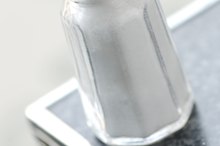Iodine and Your Kidneys
Iodine is an essential mineral found in seafood, iodized salt and some fruits and vegetables. Excess iodine is normally removed from your body by your kidneys. However, if your kidneys are unhealthy, iodine may build up in your body, resulting in iodine toxicity. People with kidney disease should avoid eating a diet high in iodine.
Iodine
The primary function of iodine in your body is the production of thyroid hormones. These hormones are essential in regulating energy use and metabolism, particularly the use of your body's energy stores, including body fat. Iodine deficiency in the U.S. and other developed countries is rare, because iodine is added to table salt. According to the Linus Pauling Institute Micronutrient Information Center, the recommended daily intake of iodine for adults is 150 micrograms 1.
- The primary function of iodine in your body is the production of thyroid hormones.
- Iodine deficiency in the U.S. and other developed countries is rare, because iodine is added to table salt.
Kidney Function
Gout and Iodine
Learn More
Your kidneys filter waste, including excess minerals such as iodine, from your blood, to produce urine. You have two kidneys that sit against your back, just below your rib cage. As your kidneys become unhealthy, they become less able to filter waste from your blood. Diabetes, high blood pressure, poisons, trauma and other diseases can cause your kidneys to stop functioning at full capacity.
- Your kidneys filter waste, including excess minerals such as iodine, from your blood, to produce urine.
- As your kidneys become unhealthy, they become less able to filter waste from your blood.
Iodine Toxicity
According to the University of Maryland Medical Center, iodine intake of more than 2,000 micrograms per day may be toxic, especially in those with kidney disease 2. Over time, even smaller intake of iodine can lead to iodine toxicity when kidneys are unhealthy.
Avoiding Excess Iodine
Can I Eat Seaweed If I Have Hyperthyroidism?
Learn More
Since the primary dietary source of iodine is table salt, avoid eating salt in excess with kidney disease. Food originating from the ocean, including saltwater fish, shellfish and especially sea vegetables such as seaweed or kelp, are high in iodine and should be limited in the diet of those with kidney disease. Iodine may be added to breads or cereal, though the levels are normally low. Fruits and vegetable may also contain iodine, although the concentration varies widely with soil quality. Raw foods such as soy and cruciferous vegetables such as cabbage and broccoli contain chemicals called goitrogens that may prevent your intestines from absorbing iodine.
- Since the primary dietary source of iodine is table salt, avoid eating salt in excess with kidney disease.
- Fruits and vegetable may also contain iodine, although the concentration varies widely with soil quality.
Related Articles
References
- Linus Pauling Institute: Micronutrient Information Center: Iodine
- University of Maryland Medical Center: Medical Reference: Complementary Medicine: Iodine
- American Thyroid Association. Iodine Deficiency. 2020.
- Eastman CJ, Zimmermann MB. The iodine deficiency disorders. In: Feingold KR, Anawalt B, Boyce A, et al., editors. Endotext. South Dartmouth, MA: MDText.com, Inc. Updated February 6, 2018.
- Ahad F, Ganie SA. Iodine, Iodine metabolism and Iodine deficiency disorders revisited. Indian J Endocrinol Metab. 2010;14(1):13-17.
- Kostoglou-athanassiou I, Ntalles K. Hypothyroidism - new aspects of an old disease. Hippokratia. 2010;14(2):82-87.
- American Thyroid Association. Hypothyroidism in Children and Adolescents. 2020.
- National Institutes of Health, Office of Dietary Supplements. Iodine. Updated July 9, 2019.
- U.S. National Library of Medicine. Congenital hypothyroidism. Updated February 11, 2020.
- Johnson LE. Iodine. Merck Manual Professional Version. Updated October 2018.
- Murthy MB, Krishnamurthy B. Severe irritant contact dermatitis induced by povidone iodine solution. Indian J Pharmacol. 2009;41(4):199-200. doi:10.4103/0253-7613.56069
- Puchalski AR, Chopra IJ. Radioiodine treatment of differentiated thyroid cancer despite history of 'iodine allergy'. Endocrinol Diabetes Metab Case Rep. 2014;2014:130084. doi:10.1530/EDM-13-0084
- Schabelman E, Witting M. The relationship of radiocontrast, iodine, and seafood allergies: a medical myth exposed. J Emerg Med. 2010;39(5):701-707. doi:10.1016/j.jemermed.2009.10.014
- National Institutes of Health, Office of Dietary Supplements. Iodine. Updated July 9, 2019.
- American Cancer Society. Radioactive Iodine (Radioiodine) Therapy for Thyroid Cancer. Updated March 14, 2019.
- Centers for Disease Control and Prevention. Potassium iodide (KI). Updated April 4, 2018.
- Kalra S, Unnikrishnan AG, Sahay R. The hypoglycemic side of hypothyroidism. Indian J Endocrinol Metab. 2014;18(1):1-3.doi:+10.4103/2230-8210.126517
Writer Bio
Chris Daniels covers advances in nutrition and fitness online. Daniels has numerous certifications and degrees covering human health, nutritional requirements and sports performance. An avid cyclist, weightlifter and swimmer, Daniels has experienced the journey of fitness in the role of both an athlete and coach.









